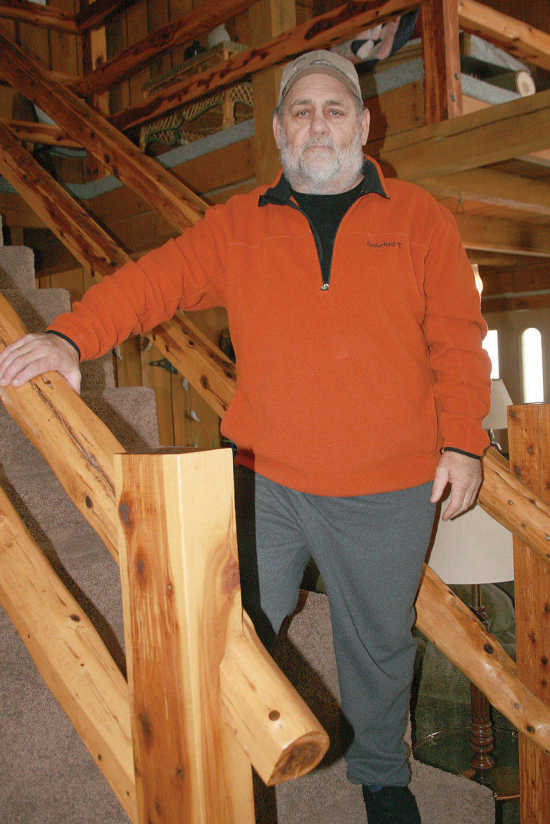Lasting Gifts

COATESVILLE -- John Boller has always been a hard worker.
He built the house he lives in -- a log cabin with a stone chimney -- himself. He spent many years farming and doing construction work.
But for the past several years Boller, 61, has had to curtail many of his activities.
Boller is a diabetic, and his health began declining. He lost sight in one eye, and in 2003 was diagnosed with colon cancer.
"I took chemotherapy and radiation, and in June of '04 I had surgery and got all the cancer out," Boller said.
Shortly afterward, however, cancer was discovered in Boller's lymph nodes, and he had to take another course of chemotherapy.
"About six months later, they said my kidneys had quit," he said. "I think the chemo killed my kidneys."
Most people have two kidneys. They are located on either side of the spine, just below the rib cage. Each kidney is about the size of an adult fist.
The kidneys are connected to the bladder by tubes called ureters.
Kidneys carry out a variety of functions. They remove waste and extra fluid from the body, which is why many people whose kidneys are failing experience swelling (known as edema) in the arms, hands, legs, feet and face.
Kidneys also make urine, control the body's chemical balance, help control blood pressure, help keep bones healthy and help make red blood cells.
Four years ago, Boller was forced to go on dialysis. He went to Danville for a five-hour-long treatment three times a week.
"It didn't bother me that bad," Boller said. "I'd try to stay up the night before so I could sleep while I was doing it. I had my ups and downs."
Soon after he began dialysis, Boller was put on a kidney transplant waiting list. This past New Year's Day, he received a call telling him a match for him had been found.
That was the same day he took his last dialysis treatment.
On Jan. 3, Boller received a kidney transplant at the Indiana University Medical Center.
"The kidney transplant operation involves an incision on the lower part of the abdomen to connect (the recipient's) blood vessels to the new kidney and the ureter (urine tube) of the new kidney to the bladder," information at the National Kidney Foundation's website said. "The operation usually takes about three hours. Many times, the new kidney begins to work right away."
Boller was in the hospital for six days. He went to his son's house to recover for a week and a half, then went home.
He has had few ill effects from the surgery.
"I'm sore and it's tight sometimes when I get up to walk," he said. "But I can see my knuckles again."
Boller heats his home with wood, and he said one of the chores he is unable to do is bring firewood into the house.
"The pieces are less than 10 pounds, though, so I can load them into the stove," he said.
Boller takes upwards of 20 medications each day.
"I have anti-rejection meds and other pills," he said. "I'll have to take them for the rest of my life."
Boller knows very little about his donor, other than he was deceased.
"It was somebody in their 40s, and he was a big man," he said. "They don't tell you much. I'm curious in a way, but you have to respect the donor's privacy."
Boller has five children who range in age from 22 to 39. One son and one daughter were tested, but his daughter became ill with meningitis during the testing process and it was discovered his son had kidney stones.
He also has three siblings, but none were suitable donors.
Boller said his oldest daughter plans to write a letter to his kidney donor's family.
"(The organ procurement organization) can get it to his family," Boller said.
Boller admitted that he used to have "negative thoughts" about organ donation.
"I wouldn't have done it," he said simply. "I didn't want to be cut on after I was dead."
Now Boller realizes what a difference organ donation can make for a recipient and his or her loved ones.
"I think my whole family feels that organ donation is important now," he said.
Boller said he feels better than he has in years.
"It's better," he said. "It's a lot better. I don't have to drive to dialysis three times a week. I don't have to take those big needles anymore."
Boller also has 13 grandchildren who range in age from 2 to 18, and said he is happy the transplant has improved his health so he can do more with them.
One of Boller's sons lives with him, as does one of his teenaged grandsons.
"They're great help for me," he said. "I'm on disability now, and I have to watch what I do. I overdo sometimes."
Boller is looking forward to spring. The winter weather has made him nervous about going outdoors.
"I haven't been outside. I'm afraid I'd fall on the ice," he said. "It's probably a good thing I had the surgery in the winter so I gave myself time to recover. If I'd had it in the spring or summer when it was nice out, I'd have been out on the lawnmower."
The organization Boller worked with on the transplant could facilitate a meeting between Boller and his donor if the donor's family requested one.
"I wouldn't be negative to that, but it's up to them," Boller said.
If he could send a message to the donor family, Boller said he would first express his sympathy.
"I'd say thank you, and that I was sorry for their loss," he said. "I've thought about what I might say to them if I ever met them, but it's really hard to put into words."
